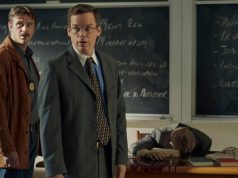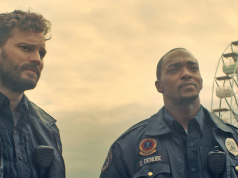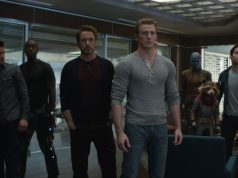People go to the movies for one or more of these reasons: to laugh, to cry, to feel suspense and excitement, or to feel warm and fuzzy. “Frequency” is the rare item that blends all of those into one fine-tuned, engaging movie, rarely missteping and never failing to deliver what it promises: drama, pathos, humor, and thrills, all blended seamlessly together.
In October 1999, a cop in Queens named John Sullivan (James Caviezel), living in the house he grew up in, finds his dad’s old ham radio. On a whim he turns it on, and, through some cosmic fluke, starts talking to his dad, Frank (Dennis Quaid), exactly 30 years earlier. (They’re even both sitting at the same desk.)
The reunion is bittersweet. John loved his fireman dad, who died in a blaze when John was still young, and is overjoyed to talk to him again. Frank is confounded at the idea of his son — who is 6 years old and sitting in the next room — talking to him as a 36-year-old in the future.
As luck would have it, that fatal fire is only two days away. John is able to warn Frank about it, and he survives. All are happy.
One problem, though. The instant Frank survives that fire, everything else in John’s life changes. He didn’t grow up fatherless anymore. His mother, Julia (Elizabeth Mitchell), was not widowed. Everything Frank does from then on is something he wasn’t originally supposed to do.
The idea of changing the past and the future has been dealt with many times in movies, of course, and “Frequency” even borrows “Back to the Future’s” trick of having people disappear from photographs. Where “Frequency” departs, though, is in its psychology: As soon as Frank survives the fire, John is flooded with a NEW set of growing-up memories, which include his dad dying much, much later, this time of lung cancer — but he still remembers the “old” memories, too.
This becomes pivotal, as a serial killer in 1969 who murdered three nurses and was never caught, suddenly now had 10 victims (John, a cop, is privy to this information). Somehow, Frank living past Oct. 12, 1969, had a ripple effect that quashed whatever it was that stopped the killer — and one of his additional victims is Julia, making it imperative that John somehow help his dad, 30 years in the past, catch the bad guy.
This leads to a climax that is nothing short of brilliant, a truly innovative experiment in jaw-dropping suspense and giddy sci-fi excitement. I won’t spoil it; you’ll know it when it happens, and you’ll be thrilled at the ingenuity of it.
There is cleverness all around, in fact. The basic premise is interesting, as is the idea of “new memories” being inspired when the past is changed. Also, no film I know of has ever handled two stories, set in different times, so well, switching back and forth between them with absolute flawlessness.
The mark of a good story is to take a very specific situation and make it relevant to everyone. John and Frank’s ham-radio reunion is an impossible scenario, of course. But strong, tearful acting from Quaid and Caviezel, not to mention sensitive direction from Gregory Hoblit, makes it universal: It’s a boy getting one more chance to talk to his long-dead father. If you refuse to get choked up over that because of the implausibility of the science involved, then you need to go outside and come back when you’re ready to behave.
The film’s only mistake is its resolution, which is over-the-top sappy, complete with an unbearable Garth Brooks song. Up until that point, “Frequency” is genuinely heartfelt and innovative, a triumphantly original film that manages to thrill and uplift with equal deftness.
A- (; )





